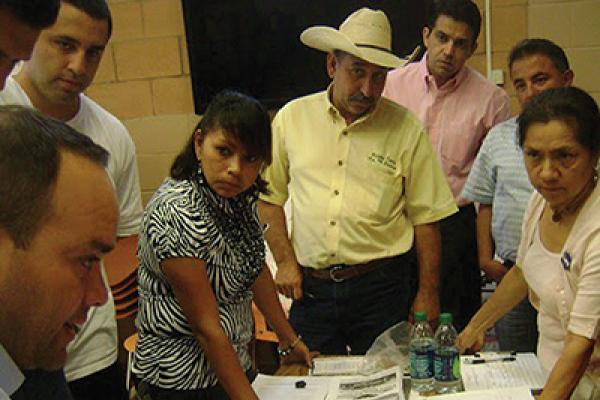SIRI CANNOT TAKE you to the South Tower Estates in the southernmost Texas border community of Little Mexico. Among the more than 1,200 recognized colonias in the Lower Rio Grande Valley, South Tower is one of the more established: Streets are paved and lots have curbs, if not sidewalks—amenities that were required for colonias only after the adoption of model subdivision rules in 1989. A few solar-powered light fixtures even dot the streets at night.
But the neighborhood still is without city council representation. All residents are connected to the main thoroughfare between their homes and jobs by a single intersection. A dead dog in the middle of the road bakes in the hot summer sun.
Colonias began around the 1950s as semi-permanent camps in southwestern border states—Texas, New Mexico, Arizona, and California—developed by private landowners to house the farm workers they employed. Once the land was paid off, an owner was relieved of any responsibility to further maintain, much less improve, their property; many landowners didn’t fix or change a thing for decades. Today, amenities in colonias vary dramatically from one to the next, and many lack wastewater management, trash collection, and street lights.
Eva Carranza lives in South Tower Estates with her 15-year-old daughter. Like many families in their neighborhood, they have mixed documentation status. Eva’s daughter is starting to think about college, but it’s tough to get information about different schools’ standardized test and GPA requirements, applications and deadlines, or available scholarships and loans. Though some families in their neighborhood have cell phone and internet access, few have a computer. Libraries offer web access—but there aren’t any libraries in the colonias.
So Carranza turned to ARISE (“A Resource in Serving Equality”), a grassroots organization that helps youth and women who live in colonias through leadership development and education programs. Inspired by Luke 4:18—“God has chosen me to bring good news to the poor”—Catholic Sister of Mercy Gerrie Naughton founded ARISE in 1987. Since then, ARISE, which is co-sponsored by the Sisters of Mercy, and the Sisters of Charity of the Incarnate Word, has supported preschool education and summer reading programs for children in colonias. ARISE has also organized parent-teacher associations that give parents confidence to engage with their children’s teachers and help area students matriculate and graduate.
At a summer meeting in ARISE’s unincorporated Hidalgo County location, the smell of fresh cinnamon rolls and coffee mingled with the foul odor of wastewater as women laughed and chatted, reflecting on the just-concluded biennial Texas legislative session and gearing up for the start of another school year. According to executive director Lourdes Flores, the goal of ARISE is simple: Ask women what they want for their communities. Then give them the skills to help them get it.
A vision for a better life
Embedded in ARISE’s goal is a philosophy of social change that assumes the people who know best what a community needs are the members of that community. It’s a powerful philosophy, but it isn’t new. During the 1980s, César Chávez started organizing United Farm Workers (UFW) in the Lower Rio Grande Valley. Shortly thereafter, Texas Low Income Housing Information Service, aka Texas Housers, expanded into the area from Austin, partnering with ARISE, UFW, and the Community Development Corporation of Brownsville (CDCB), among others. But after a late freeze destroyed the region’s crops, followed by hurricanes and tropical storm-related flooding that destroyed members’ homes, the UFW almost went out of business.
Instead, UFW members paused, reorganized, and relaunched in 2003 as LUPE: La Unión del Pueblo Entero. Despite their modest resources, LUPE members pay to join, and their grassroots community organizers (including many former agricultural workers) have advocated for everything from healthier working conditions and better neighborhood infrastructure to early childhood education and prison reform. The fruit of their labor can be seen around town, from OSHA training signs protecting workers with extended contracts to the installation of new electric street lights needed to safely illuminate roads for vehicles and pedestrians in eight colonias.
“I’ve been doing this a long time and believe ultimately in people getting organized with goodwill to take action to solve problems at the local level,” says Texas Housers’ co-director John Henneberger. “The things I believe that hold the deepest solutions are ones where people in a community sit down, identify a concern, and organize together to engage the public and private sector to solve the problem based on a local need and a locally designed custom response to the problem.”
Recently, about a dozen members from LUPE and ARISE partnered with Texas Housers to form a grassroots leadership development program. Their mission: to build a common vision and a set of solutions to make life in the Lower Rio Grande Valley better for working families.
The inaugural cohort of community organizers—who together are known as LUCHA (“Land Use Colonia Housing Action”)—invested a year studying four subjects in-depth: land use, housing, public services, and infrastructure. During their second year in the program, the leaders shared their newfound knowledge with the community groups they represent, attending and testifying at local town halls and in state board and commission hearings regarding the deployment of resources. They discovered that although the colonias do not belong to any municipality, their county commissioners were receptive to suggestions, even raising taxes to pay for public lighting that would make their communities safer. And while Texas’ state legislature was unwilling to fund some of their ideas with taxpayer dollars, LUCHA discovered that the banks of the Lower Rio Grande Valley had the capacity and inclination to privately fund expansion of their successful solutions.
Fighting climate change
Another major concern for community groups such as LUPE and ARISE has been protecting colonia residents from the ravages of climate change. For example, in the wake of Hurricane Dolly, which caused more than $1 billion in damage to the Texas Gulf Coast, most residents displaced from the Rio Grande Valley colonias were unable to rebuild. Federal government aid in rebuilding was slow and costly; reconstruction didn’t begin until six years after the 2008 hurricane, and the temporary shelter offered by FEMA trailers was expensive, costing $70,000 to $75,000 per trailer. Not to mention the eventual cost of a permanent replacement house, an additional $125,000.
Rather than wait for a solution devised by outsiders, Texas Housers, Lower Rio Grande Development Council, CDCB, and building community Workshop (bcWorkshop) collaborated to pilot RAPIDO, a $2 million rapid rehousing recovery program that succeeded in creating prototypes for permanent 450- to 500-square-foot “core” houses, each equipped with a full bath, kitchen, bedroom, and living space that could be constructed in roughly a week for around $15,000 to $20,000 each, offering almost-immediate shelter to displaced families and eliminating the need for FEMA trailers. And once emergency housing is no longer needed, these core homes can be converted into a permanent three- or four-bedroom house for an additional $50,000 to $70,000—far less than the average cost of FEMA houses and trailers. So far, 20 permanent homes have been built in Texas’ Willacy, Cameron, and Hidalgo counties; RAPIDO’s partners CDCB and bcWorkshop are now working on a loan program with local Lower Rio Grande Valley banks to spread the model across Texas.
‘Everybody deserves to live with dignity’
RAPIDO helped earn Texas Housers' Henneberger a MacArthur Fellowship, commonly called a “genius grant.” Though Henneberger admits that the fellowship has helped Texas Housers get “listened to and taken seriously,” he’s embarrassed by all the fuss. “It’s very affirming and humbling to receive, but we’re doing the same things we were doing a year ago,” he explains.
Those “same things” include empowering local residents to create their own solutions, including Henneberger’s new Lower Rio Grande Valley regional co-director Josué Ramirez. “Even though I’d lived most of my life in a colonia, I was really unaware of the resources available to the colonia and the strong organizing happening,” says Ramirez. He was undocumented when his parents brought him to the U.S. as a 5-year-old; he grew up in a colonia outside Los Fresnos, Texas. After becoming a naturalized citizen and graduating high school, Ramirez attended the University of Texas-Austin, where he earned dual degrees in Mexican-American studies with a focus on policy and Spanish teaching. He worked on an unsuccessful political campaign in California, then moved back in with his parents in the colonia, applying to work for Texas Housers as a policy analyst.
“People have the answers; it’s just a matter of giving them the resources to put their knowledge into action,” says Ramirez, who helped convene the inaugural cohort of LUCHA. “I want to provide [LUCHA] with the resources they need, whether fixing public lights, fixing the street, or getting trash collection in the neighborhood. Those are on-the-ground works, but that’s what’s changing things. Aside from the work I do here, I’ve been lucky enough to work at the state and federal policy level to change the system, dismantling the system that keeps disenfranchising communities of color—especially low-income communities, which are my communities.”
They are also the communities of his LUCHA colleague, LUPE project coordinator Esther Herrera, a formerly undocumented student who qualified for in-state tuition under the Dream Act. She earned a master’s degree and is now working on her Ph.D.
As Herrera recalls a fellow Dreamer from Mission, Texas, who lost hope he would be able to go to college and took his own life in 2011, Ramirez removes his glasses and wipes his eyes, while Herrera’s voice breaks.
“We have to get organized because just like him, there are many other kids,” Herrera says. “I knew the struggle of growing up undocumented, so through that, I can relate. I had very good role models, very good counselors growing up who didn’t let [documentation] limit me getting the education. We advocate for many issues to ensure everybody has those same opportunities.
“It takes a very special person to do this kind of work—long hours, unstructured work settings—but we do it because we have the heart, because we’ve suffered just like our members have,” Herrera says. “Everybody deserves to live with dignity. Just like people take the time to care about my education and my future, that’s why we take the time to care about their future and their kids’ future.”
This article was amended from the print version to correct the reference to the Sisters of Charity of the Incarnate Word. This article was also amended to show that Josué Ramirez was not a beneficiary of the Dream Act, as the print version stated.

Got something to say about what you're reading? We value your feedback!

